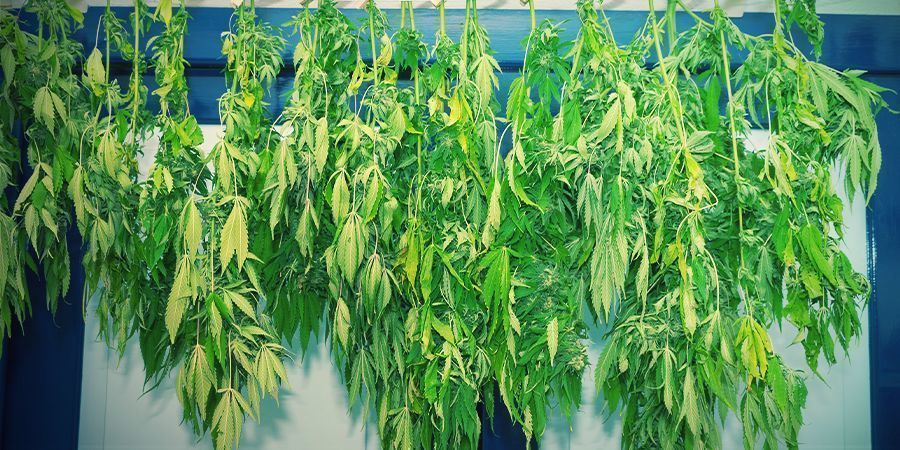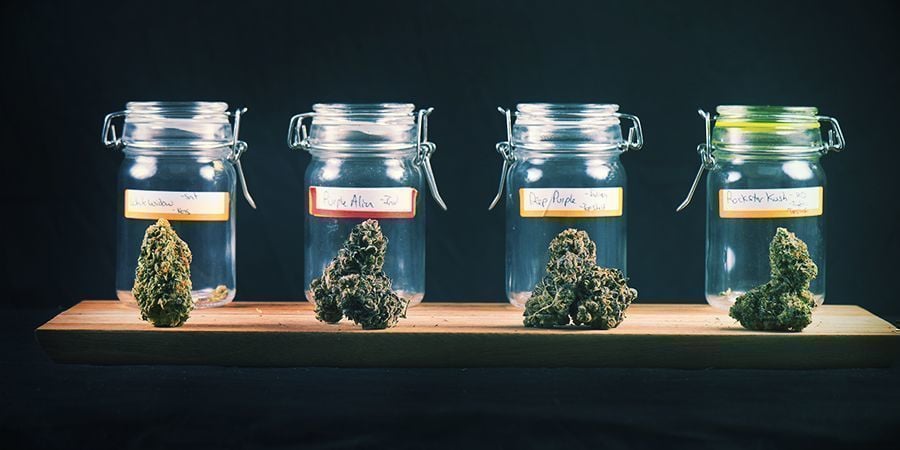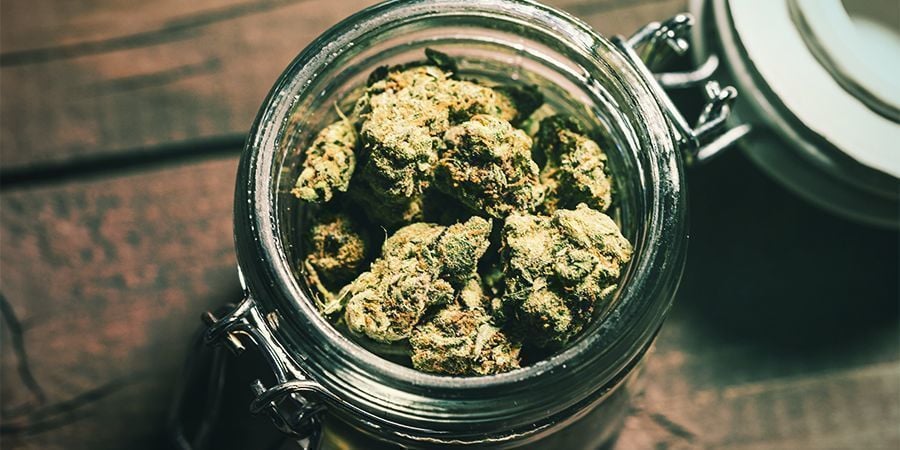
How To Properly Dry And Cure Cannabis Buds
Drying and curing cannabis is a crucial step if you want to obtain the best bud possible. Curing allows for the refinement of the fragrance and potency of your cannabis, fine tuning it to perfection.
Properly dried and cured weed can make all the difference from the poor stuff you can find on the street. Most of the time, cheap bud has not been dried and cured properly, as the grower’s emphasis is on a fast a turnaround instead of on producing the best quality they can. In many places this is further facilitated by the fact that many who rely on the street know no different. You can tell when a grower has cut corners when the weed appears dry on the outside, but can be damp, and hard to burn at its centre.
The first process is drying the cannabis. This removes a lot of the water content from the bud, making it easier and much more pleasant to burn and smoke.
DRYING CANNABIS BUDS

The drying process is fairly straight forward, but it is time consuming. First, a dark room will be required. This is because light degrades THC, so by drying marijuana in a dark room, it ensures the potency is not negatively affected.
Hang the stems of your manicured cannabis plants upside down, so that the tops of the plant are facing downwards. Also, ensure that no two plants are touching each other. This will ensure that air is able to move all around each plant, maximising surface area and preventing mould.
The room temperature should be maintained at around 20 degrees Celsius for the first 3 days, and then reduced to around 17-18 degrees. This will ensure that a lot of excess water is evaporated quickly, but also gives other compounds within the plant to evaporate as well. The whole process should take between 10 – 20 days.
As the marijuana is drying, a relative humidity of 50 percent should try to be maintained. This encourages water to leave the marijuana at a decent speed, without causing it to dry out to fast. A hygrometer can be used to measure the relative humidity of a room, and ventilation, de-humidifiers and humidifiers can be used to control it.
At the same time as maintaining a stable relative humidity, it is also important to maintain adequate ventilation. A supply of fresh air will minimise the risk of mould. It is worth noting however, freshly cut marijuana is extremely smelly, especially within the first few days of drying. It is wise to have the proper precautions in place to stop unwanted attention – such as drying in a discreet location, or in your grow room with the air filter switched on. That‘s the most ideal place, the only drawback being that due of the required darkness, the room can‘t be used for cultivation during that time.
You will know that your cannabis is properly dried when the stems are easy to break. When you bend them they should snap immediately, if they bend, then they probably need a bit longer.
Understandably, this process can be a bit boring, but in any case - do not try to speed it up by other means, such as by using a heater fan or a microwave. This will do much more damage to the quality of the final product than any good. This is because it is not just water that is evaporating. Chlorophyll, the organic compound with which plants turn sunlight into energy also evaporates from the plant, but at a much slower pace. If the cannabis is dried to quickly, it does not give the chlorophyll the time it needs to properly leave the marijuana. Chlorophyll contains magnesium – if this is not properly removed from the weed, it can result in a very sharp and bitter smoke.
CURING CANNABIS BUDS

Once the bud is properly dried, it‘s time for the next step - curing. While you may find well dried cannabis on the street, nicely cured cannabis is much more difficult to get a hold of. It is somewhat of an art form and can be quite hard to master, but with practice, it can really boost the overall quality of the weed. Curing gives the bud the final polish that brings out the best possible aroma and high.
The curing process allows for two main things to happen. Firstly, it allows bacteria time to breakdown any remaining chlorophyll. As mentioned, chlorophyll contains magnesium, which can lead to an unpleasant taste. By giving bacteria the time and environment to properly breakdown any remnants, it drastically improves the final taste and experience.
Secondly, curing weed gives a definite control over the precise moisture level. The drier cannabis is, the stronger and easier to burn it becomes. However, the offset here is that as it becomes drier, it becomes brittle and begins to lose its flavour. A master of curing will be able to determine the exact balance of humidity, and know when the best time to move the bud from drying to curing is, and then cure it to the ideal point.
There are quite a few curing techniques that have proven themselves over time. The following is one that is often thought to yield best results. The entire curing process can take anywhere from 2 weeks to 2 years, however, most bud will be well cured after 2-3 months.
Firstly, air tight glass jars will be required - the kind with a rubber seal and locking mechanism are best. Loosely fill each jar to about 2/3 of its capacity with bud. This will ensure that there will be enough air present to keep the bacteria alive, as well as ensuring it can circulate efficiently around the cannabis. If the bud is too compacted, it can lead to problems with moisture control and mould.
Store the jars in a cool dark place to prevent light from causing THC degeneration. Open the lid of the jars each day for the first 2 weeks for a short period of time. This allows you to check the bud for mould, rotate and move it a bit to ensure even air flow, control moisture levels, as well as replenishing the air supply to the bacteria.
Try to catch a whiff of the smell every time you break the seal of the jar. If the first air to be released smells of ammonia, or damp hay, then too much moisture has been left in the jar, and the bacteria is dead – this curing attempt is over.
If you get past two weeks without smelling ammonia then the attempt is likely to remain a success. The jar can now be open less frequently, but ensure to regularly check the bud for signs of mould.
While the benefits of curing can be seen after just 2 weeks, the best results are obtained by maintaining it for at least 4 weeks - but the curing process can continue for up to two years! Some connoisseur smokers will only smoke cannabis that has been cured for at least a year!
OUR CURING TIPS

As mentioned, curing is a finite way of controlling moisture. As curing can be quite hard to master, it is easy to find yourself in a position where the cannabis has got too dry for liking. In this situation, there are a couple of ways to “re-hydrate” your cannabis.
Firstly, it possible to add in newer cannabis into the jar. As this slowly continues to dry, the extra moisture it puts into the jar’s air will balance the rest of the weed to an equilibrium, adding a bit more moisture to restore aroma and taste.
Secondly, some cannabis growers will add in slices of fruit, such as orange, when their weed gets a bit too dry. This works in the same premise as the previous method, but can also add a unique flavour of its own to the weed. It is best to experiment and see what works best for you!
The process of drying, and especially curing can be challenging at first, but they are well worth the wait. With time, it is possible to fine tune the quality of weed to a very precise degree. Well cured weed is what separates connoisseur level weed from the standard – once you have had it you won’t look back.
-
 5 min
17 March 2022
Top 10 Feminized Outdoor Cannabis Strains
Spring is here and it is time to start putting some seeds in the ground. To help out, we have put together a list of our top 10 feminized cannabis seeds for outdoor growing.
5 min
17 March 2022
Top 10 Feminized Outdoor Cannabis Strains
Spring is here and it is time to start putting some seeds in the ground. To help out, we have put together a list of our top 10 feminized cannabis seeds for outdoor growing.
-
 5 min
6 September 2019
Top 10 Best Cannabis Strains
Ever wondered what our favourite cannabis strains are here at Zamnesia? Wonder no longer, we have put together a list of our top 10.
5 min
6 September 2019
Top 10 Best Cannabis Strains
Ever wondered what our favourite cannabis strains are here at Zamnesia? Wonder no longer, we have put together a list of our top 10.
-
 2 min
18 March 2019
The Best Way To Store A Rolled Joint And Keep It Fresh
For the practical stoner, keeping a stash of pre-rolled joints is good practice for when you want to get high at a moment's notice. We take a look at the best ways to store a rolled joint and keep...
2 min
18 March 2019
The Best Way To Store A Rolled Joint And Keep It Fresh
For the practical stoner, keeping a stash of pre-rolled joints is good practice for when you want to get high at a moment's notice. We take a look at the best ways to store a rolled joint and keep...













 United States
United States










